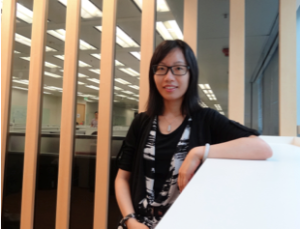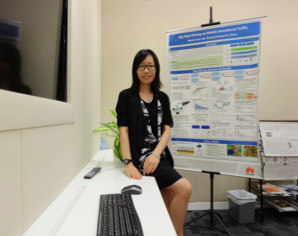Reflections from a CIFellows Alumna
During the economic downturn in 2009, Xiaojuan Ma was one of the many new PhDs in computing who considered delaying or abandoning a research career because of insufficient funding. From 2009- 12, the Computing Community Consortium (CCC) developed and administered the Computing Innovation Fellows (CIFellows) project, a short-term initiative that addressed this problem by providing funding for 127 postdoctoral positions throughout academia and industry.
 I still remember the great joy and excitement that the acceptance letter from the CIFellows Project brought me in the summer of 2010. Surrounded by bad news about an economic downturn and hiring freeze in both academia and industrial research, I was a fresh doctoral graduate at the time and not sure if I was ready for the highly competitive job market. Because my Ph.D. thesis was not on a mainstream research topic in Human-Computer Interaction (HCI), I was concerned that I would have to compromise my research interests for job openings. Receiving the CIFellows award was an honor, but more importantly, an opportunity for me to shape, sharpen and better package my research expertise. My two-year experiences as a post-doc in the Human-Computer Interaction Institute (HCII) at Carnegie Mellon University enhanced my credentials as a researcher, preparing me for the challenges of the real world.
I still remember the great joy and excitement that the acceptance letter from the CIFellows Project brought me in the summer of 2010. Surrounded by bad news about an economic downturn and hiring freeze in both academia and industrial research, I was a fresh doctoral graduate at the time and not sure if I was ready for the highly competitive job market. Because my Ph.D. thesis was not on a mainstream research topic in Human-Computer Interaction (HCI), I was concerned that I would have to compromise my research interests for job openings. Receiving the CIFellows award was an honor, but more importantly, an opportunity for me to shape, sharpen and better package my research expertise. My two-year experiences as a post-doc in the Human-Computer Interaction Institute (HCII) at Carnegie Mellon University enhanced my credentials as a researcher, preparing me for the challenges of the real world.
I really appreciated the flexible and supportive research environment that the CIFellows Project secured in such a difficult economy. The project provided sufficient funds for research-related activities, so I was able to conduct independent post-doctoral research on problems that actually interested me. In addition, the project connected me to HCII, a strong HCI program with a different culture and setting from my graduate institution, something I might not have had access to otherwise. At the Institute, I was exposed to diverse areas in HCI and worked with talented faculties, researchers, and students with diverse backgrounds.
With the guidance and help from my CIFellows mentor Professor Jodi Forlizzi, I extended my Ph.D. research in both breadth and depth, and explored new directions. My dissertation was on developing visual and auditory communication support for people with language disabilities. Professor Forlizzi, who is an expert on interaction and service design, introduced me to new communities that may benefit from our work on visual communication systems. For example, I worked with the Patient and Family Centered Care (PFCC) group at the Magee Women’s Hospital of University of Pittsburgh Medical Center (UPMC) to design better discharge instructions for patients with low health literacy. It was exciting to learn that my research could have a broader impact in the community. Not only was my research output employed to convey different types of information – from everyday concepts, to domain-specific expressions, to complex scenarios, but also the methods I developed can be easily adapted and applied to the design process in other domains.
 Coming from a computer science background, I used to work mainly on the system perspective of creating an effective visual and auditory communication support. Professor Forlizzi taught me how to address the problem from a designer’s point of view. I received training and great practice in producing and evaluating design alternatives, such as using grounded theory to discover valuable information from interviews with artists and expert designers, coding features in design examples to identify conventions and overlooked issues, as well as using eye tracking technologies to analyze people’s attention and reaction to a given design. Furthermore, I have been experimenting with ways to combine traditional design methods with new approaches, including building computational models to measure the utility of a visual design, and crowd computing, i.e. harnessing crowds out in the web to generate ideas and feedback on designs.
Coming from a computer science background, I used to work mainly on the system perspective of creating an effective visual and auditory communication support. Professor Forlizzi taught me how to address the problem from a designer’s point of view. I received training and great practice in producing and evaluating design alternatives, such as using grounded theory to discover valuable information from interviews with artists and expert designers, coding features in design examples to identify conventions and overlooked issues, as well as using eye tracking technologies to analyze people’s attention and reaction to a given design. Furthermore, I have been experimenting with ways to combine traditional design methods with new approaches, including building computational models to measure the utility of a visual design, and crowd computing, i.e. harnessing crowds out in the web to generate ideas and feedback on designs.
During my time as a CIFellow, I identified my main research interest in leveraging online crowds to design multimedia-mediated communication support, and actively expanded my knowledge and strengthened my skills around this topic. I have also received great help from my mentor and collaborators to improve my marketability, e.g. how to advise students, write papers and grants, and promote my research in and outside of the HCI community.
The CIFellows Project also provided me with great opportunities for networking. Through the project, I met Cindy L. Bethel, a 2009 CIFellow and now an assistant professor at Mississippi State University, and got introduced to the Human-Robot Interaction community. I have been involved in the program community of the International Conference on Collaboration Technologies and Systems Workshop on Collaborative Robots and Human Robot Interaction ever since. In May 2012, I attended the ACM SIGCHI Conference on Human Factors in Computing Systems with travel support from the project, where I learned about the newly founded Noah’s Ark Lab in Hong Kong.
One of the visions of the Noah’s Ark Lab is to develop innovations that will facilitate the next generation of human-computer interaction which should be natural, accessible, adaptive / adaptable, context-sensitive, mobile, and usable. The key approach – lifelong user modeling based on crowd data – aligns well with my research direction. Although I had few experiences with industrial research, the professional skills I have gained over my Ph.D. and post-doctoral studies built my confidence. I have been working in the Noah’s Ark Lab for half a year, and I view it as an opportunity to establish HCI research in Hong Kong and make further impact on the community in both China and Asia.
The great efforts made by the CIFellows Project allowed me to continue to grow to my full potential when the funding situation was difficult, and to pursue a career in research in a tough job market. I really appreciated my time as a CIFellow, when I led research projects, supervised interns, and reached out for collaborations. It has been rewarding to see how my experience gained as a CIFellow is now making a difference in computing research.








